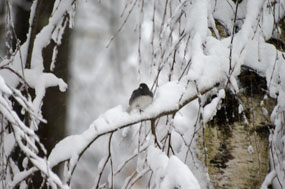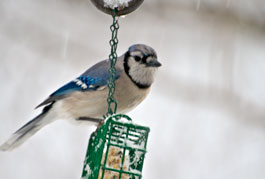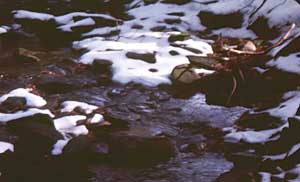 Winter teaches us that the only way to fully enjoy the powers of the season is to surrender to it and learn from what it has to offer us. In winter the earth lies fallow; nature appears frozen and dead. In this deep stillness of nature, winter calls us to look into our depths, to reconnect to our inner being, to befriend the darkness within us and around us. In winter—like the seeds that are beginning their metamorphosis and starting to manifest their destiny in the deep recesses of the earth—all of our energies are being called to examine the depths of our being.
Winter teaches us that the only way to fully enjoy the powers of the season is to surrender to it and learn from what it has to offer us. In winter the earth lies fallow; nature appears frozen and dead. In this deep stillness of nature, winter calls us to look into our depths, to reconnect to our inner being, to befriend the darkness within us and around us. In winter—like the seeds that are beginning their metamorphosis and starting to manifest their destiny in the deep recesses of the earth—all of our energies are being called to examine the depths of our being.
In winter, nature seems to be at rest, and in this rest replenishes itself. The legendary Yellow Emperor, considered to be the founder of Traditional Chinese Medicine, states in his ancient text The Yellow Emperor’s Classic of Internal Medicine* that “In winter all is hidden. Winter is the season of retirement into depth, because of the cold outside. At this time you must not disturb or disperse the yang (Fire, active) energy so that you can allow the yin reserves to be re-established within you.”
This depth—our core—is the place where we are afraid to journey; so in this season of darkness we try to fill it with what appears to be light. We celebrate the holidays, eat and drink heartily, socialize frequently, and try to avoid the aloneness that winter calls us to, without realizing that the entry to our inner world is most accessible during this time of the year.
There is a well-known story of the Sufi wise man Mulla Nasruddin, who one night was combing through the dirt under a street lamp in front of his house. A passerby asked, “Mulla, what are you looking for?” “The keys to my house,” Mulla replied. So the two got on their hands and knees searching for the keys, and after another hour, the passerby asked, “Are you sure you dropped the keys here?” “Oh no,” said Mulla, “I dropped the keys inside my house.” Astonished, the passerby asked, “So why are we looking out here?” “Because the light is shining out here,” replied Mulla.
THE WATER ELEMENT
Water is the most yin of all the five elements. The organ systems associated with Water are the Kidneys and Urinary Bladder, which rule water metabolism and maintain homeostasis, a dynamic continual rebalancing.
 The earth’s surface is approximately 75% water, and water makes up about 60% of our adult body weight, yet it has no shape, taking the form given to it by its container. It is mutable and can become solid as ice or manifest only as vapor. The most yielding of all the elements, it will break down even the hardest rock over time and find the path of least resistance to move around any obstacle.
The earth’s surface is approximately 75% water, and water makes up about 60% of our adult body weight, yet it has no shape, taking the form given to it by its container. It is mutable and can become solid as ice or manifest only as vapor. The most yielding of all the elements, it will break down even the hardest rock over time and find the path of least resistance to move around any obstacle.
As we age we lose water, and our bodies begin to dry out. Our bones and hair become more brittle, our skin loses its elasticity, our minds may lose their accustomed flexibility. While acknowledging these changes, Traditional Chinese Medicine gives us numerous mental, physical, and nutritional tools to help retard the progression of the apparently inevitable by offering ways to augment the water reserves within us.
Emotion
Fear is the emotion associated with the Water Element. In a healthy way, fear is an emotion that moves and directs us to remain alert and attentive to our surroundings and situation. When confronted with danger, constructive fear can guide us with a message of caution and restraint and fill us with a sense of readiness and courage to face whatever situation might present itself.
When Water is out of balance, fear becomes an obstacle to movement. It might manifest as chronic anxiety or as an intense phobia, but in either case it often signifies a deficiency in the Water energy and a corresponding lack of grounding, causing the energy to be trapped in the chest. Physiologically, fear increases adrenalin production, which accelerates the heart rate; we begin to perspire, our muscles tighten, and we hold our breaths. These physical reactions feed our fear and create a vicious cycle: Traditional Chinese Medicine says that excess fear injures the Kidney energy while a dysfunction in the Kidney energy, in turn, further increases our fear.
Kidney (Yin Organ)
 Traditional Chinese Medicine teaches that the Kidneys (called the Storehouse of the Vital Essence) operate like a pilot light that can spark light within the entire body, mind, and spirit. Kidney Fire vitalizes the system and separates the pure aspects of Water from the impure. The contaminated parts of Water are transported to the Urinary Bladder for storage and elimination, while the pure parts are transformed into a mist, which is circulated freely throughout the body. This action sends warmth and energy to every cell in the body. In metaphorical terms, Kidney Fire provides the driving energy and resolute will power needed to overcome obstacles and press forward to accomplish our goals in life.
Traditional Chinese Medicine teaches that the Kidneys (called the Storehouse of the Vital Essence) operate like a pilot light that can spark light within the entire body, mind, and spirit. Kidney Fire vitalizes the system and separates the pure aspects of Water from the impure. The contaminated parts of Water are transported to the Urinary Bladder for storage and elimination, while the pure parts are transformed into a mist, which is circulated freely throughout the body. This action sends warmth and energy to every cell in the body. In metaphorical terms, Kidney Fire provides the driving energy and resolute will power needed to overcome obstacles and press forward to accomplish our goals in life.
The Kidneys also have a vital yin, or cooling and lubricating, function that assures that all the structures within the body and mind are lubricated and misted. This process keeps the body and mind flexible and prevents excessive friction from building up.
In Western medicine we know that the kidneys regulate water metabolism and stabilize the heart and blood pressure. In Traditional Chinese Medicine, the Kidney energy is also said to be responsible for healthy teeth, bones, and bone marrow. Because the ancient Chinese medical scholars considered the brain and spinal cord to be extensions of the bone marrow, the Kidney is thought to rule over the skeletal structure and function and, consequently, over intelligence, reason, perception, and memory
Urinary Bladder (Yang Organ)
The second organ associated with Water is the Urinary Bladder, which Western medicine describes as a hollow container with muscular walls, joined to the kidney by the ureters and to the body’s exterior by the urethra. Every few seconds, urine is passed from the kidneys to the bladder, where it is stored until it is eliminated through urination. In Traditional Chinese Medicine the Urinary Bladder is compared to a reservoir where the waters of the body collect. In The Yellow Emperor’s Classic of Internal Medicine,* Qi Bo explains that “The bladder is where the water converges and where, after being catalyzed by chi, it is eliminated.” When the bladder is “leaky” or somehow not functioning properly, the entire system is in danger of bogging down and filling up with toxic wastes. Depression, fatigue, difficulty adapting to new circumstances, or a general sense of foreboding are considered symptoms of an imbalance in this organ. Once we deplete our reserves, or if the bladder is leaking, acupuncture and herbal remedies can be used to revitalize the organ functions, and attention to diet, exercise, and meditation can help restore its healthy functions.
 Symptoms Associated With Imbalances in Water
Symptoms Associated With Imbalances in Water
- Lower back pain—chronic or acute
- Knee pain and weakness
- Problems with urinary retention
- Fatigue and shortness of breath
- Vertigo or dizziness
- Sexual problems, including lack of excitement, premature ejaculation, vaginal dryness
- Anxiety and excessive fear
- High blood pressure and/or occipital headaches
- Inflexibility and resistance to change
The Water Element: The Chart of Correspondences
Below is a table summarizing the basic correspondences associated with the Water element in Traditional Chinese Medicine.
How to Keep Healthy and Joyful During Winter
• Practice Self-acceptance: We all have fears; fears freeze us so that we feel stuck and hopeless, but observing our fears without judging them can liberate us from the stagnation that fear sows. We need to learn the gentle art of “witnessing” to ourselves without judging ourselves. Rather than attempting to overcome our fears, we can learn to recognize and accept them. Self-awareness and self-acceptance burns and thaws our fears so that we become “unstuck” and can move on healthfully.
• Take Time to Listen and Recharge: Listen to your body, and take time to replenish your reserves, which will be needed during the surges of spring. Winter is a time to recharge; so learn to listen—listen to what others have to say and listen to your heart speaking to you. This is a time of receiving, not doing. Be patient. • Keep a Journal: As winter is a time to go within, your inner being comes closer to the surface in winter. Keep a journal and record your feelings, thoughts, and dreams: donʼt analyze them, just record them. Donʼt be afraid of your darker side; allow any and all images to unfold; look at them again later and see if the images convey an inner message to you.
• Nurture Yourself Inwardly: Imagine that the ideas and images that have been planted and are germinating within you, as in a garden, will begin to sprout in the spring. Nurture these images of hope, but allow them to grow and develop within you quietly and naturally, just as plants grow.
• Nourish Yourself Well: Nourish yourself with warm food and drink lots of water; winter sucks the moisture out of your body. It is very important to hydrate by drinking at least 8 to 10 glasses of fresh water daily. Eat warming foods such as root vegetables, whole grains, and small amounts of meat or fish protein. If you are a vegetarian, eat more beans, nuts, and tempeh.
• Keep Warm: Prepare for the weather, and dress accordingly. Chinese medicine says that the neck and shoulder areas contain the “Wind” points through which pathogens can enter, so keep these areas protected; wear a scarf and keep your neck covered. Meanwhile, enjoy everything that winter has to offer, within nature and within your inner self.


